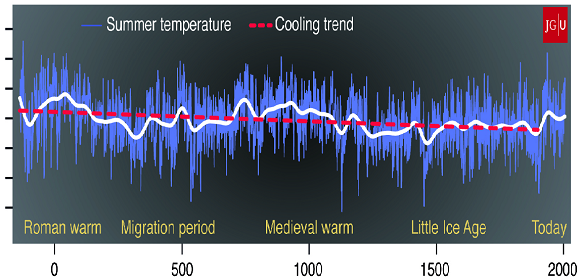Climate was HOTTER in Roman, medieval times than now: Study
IPCC has got it all wrong, say boffins
Posted in Energy, 10th July 2012 11:44 GMT
Americans sweltering in the recent record-breaking heatwave may not believe it - but it seems that our ancestors suffered through much hotter summers in times gone by, several of them within the last 2,000 years.

A new study measuring temperatures over the past two millennia has concluded that in fact the temperatures seen in the last decade are far from being the hottest in history.
A large team of scientists making a comprehensive study of data from tree rings say that in fact global temperatures have been on a falling trend for the past 2,000 years and they have often been noticeably higher than they are today - despite the absence of any significant amounts of human-released carbon dioxide in the atmosphere back then.
"We found that previous estimates of historical temperatures during the Roman era and the Middle Ages were too low," says Professor-Doktor Jan Esper of the Johannes Gutenberg-Universität Mainz, one of the scientists leading the study. "Such findings are also significant with regard to climate policy."
They certainly are, as it is a central plank of climate policy worldwide that the current temperatures are the highest ever seen for many millennia, and that this results from rising levels of atmospheric CO2 emitted by human activities such as industry, transport etc.
If it is the case that actually the climate has often been warmer without any significant CO2 emissions having taken place - suggesting that CO2 emissions simply aren't that important - the case for huge efforts to cut those emissions largely disappears.
Needless to say, prominent alarmist scientists and the UN's Intergovernmental Panel on Climate Change (IPCC) have not taken this view, arguing instead that the well-documented Roman and medieval warm periods may have taken place but either weren't very warm or only happened in limited regions (though this latter idea has lately been seriously undermined [1] by research in Antarctica).
In the IPCC view, the planet was cooler during Roman times and the medieval warm spell. Overall the temperature is headed up - perhaps wildly up, according to the famous/infamous "hockey stick" graph.
The new study indicates that that's quite wrong, with the current warming less serious than the Romans and others since have seen - and the overall trend actually down by a noticeable 0.3°C per millennium, which the scientists believe is probably down to gradual long-term shifts in the position of the Sun and the Earth's path around it.
"This figure we calculated may not seem particularly significant," says Esper. "However, it is also not negligible when compared to global warming, which up to now has been less than 1°C. Our results suggest that the large-scale climate reconstruction shown by the Intergovernmental Panel on Climate Change (IPCC) likely underestimate this long-term cooling trend over the past few millennia."
According to the scientists' new paper, published [2] in hefty climate journal Nature Climate Change, the cooling effect of orbital shifting on the climate has been up to four times as powerful as anthropogenic (human-caused) warming pressures.

Phew, what a scorcher, Marcus. Let's get in the frigidarium
A large team of scientists making a comprehensive study of data from tree rings say that in fact global temperatures have been on a falling trend for the past 2,000 years and they have often been noticeably higher than they are today - despite the absence of any significant amounts of human-released carbon dioxide in the atmosphere back then.
"We found that previous estimates of historical temperatures during the Roman era and the Middle Ages were too low," says Professor-Doktor Jan Esper of the Johannes Gutenberg-Universität Mainz, one of the scientists leading the study. "Such findings are also significant with regard to climate policy."
They certainly are, as it is a central plank of climate policy worldwide that the current temperatures are the highest ever seen for many millennia, and that this results from rising levels of atmospheric CO2 emitted by human activities such as industry, transport etc.
If it is the case that actually the climate has often been warmer without any significant CO2 emissions having taken place - suggesting that CO2 emissions simply aren't that important - the case for huge efforts to cut those emissions largely disappears.
Needless to say, prominent alarmist scientists and the UN's Intergovernmental Panel on Climate Change (IPCC) have not taken this view, arguing instead that the well-documented Roman and medieval warm periods may have taken place but either weren't very warm or only happened in limited regions (though this latter idea has lately been seriously undermined [1] by research in Antarctica).
In the IPCC view, the planet was cooler during Roman times and the medieval warm spell. Overall the temperature is headed up - perhaps wildly up, according to the famous/infamous "hockey stick" graph.
The new study indicates that that's quite wrong, with the current warming less serious than the Romans and others since have seen - and the overall trend actually down by a noticeable 0.3°C per millennium, which the scientists believe is probably down to gradual long-term shifts in the position of the Sun and the Earth's path around it.
"This figure we calculated may not seem particularly significant," says Esper. "However, it is also not negligible when compared to global warming, which up to now has been less than 1°C. Our results suggest that the large-scale climate reconstruction shown by the Intergovernmental Panel on Climate Change (IPCC) likely underestimate this long-term cooling trend over the past few millennia."
According to the scientists' new paper, published [2] in hefty climate journal Nature Climate Change, the cooling effect of orbital shifting on the climate has been up to four times as powerful as anthropogenic (human-caused) warming pressures.
No comments:
Post a Comment